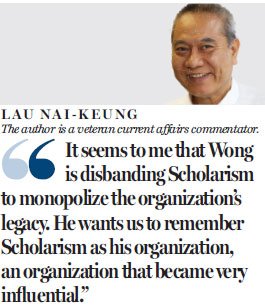What Joshua Wong and Papi Jiang actually have in common
Updated: 2016-03-22 08:34
By Lau Nai-keung(HK Edition)
|
|||||||
Two interesting incidents have taken place in the last few days. Student activist group Scholarism, which played a leading role in the 2014 "Occupy Central" protests, announced it is "suspending work".
Papi Jiang, a graduate student from the Central Academy of Drama who is known for making humorous videos, has secured investment of 12 million yuan ($1.85 million), or HK$14.4 million.
Wong is, of course, our city's protge of "democracy". Papi Jiang, now very famous on the mainland, has captured considerable attention on media platforms via more than 40 original videos since the beginning of the year.
Both Wong and Papi are very young, and they both owe their success in large part to the Internet and especially to social media.
According to media platform yoka.com, there are more than 1 million Internet celebrities, or wanghong, in China. Some 35.9 percent of these wanghong become famous by making live videos (Papi Jiang), 18.2 percent went viral leveraging their one-minute fame on the news (Wong), another 27.3 percent made it on "micro-media" platforms now popular on the mainland.
In the age of social media, organization forms and behavioral norms have changed so much that people like myself can barely understand them.
In the past, we believed an organization should be governed by democratic principles, especially if it claims to be advocating democracy. We also believed an organization is larger than individual members, including its leaders. Members and leaders leave the organization and move on to do other things, but the organization survives them. These are the merits to having an organization - or so we thought.
Explaining why Scholarism is disbanding, Wong said the group he formed five years ago was now too heavily politicized in the wake of the 79-day "Occupy Central" protest. This made it difficult for them to reach out to schools.
"I managed to conduct sharing in some 30 schools after I finished the public exams, but after the umbrella movement I have been (invited) by only one or two schools, with one being besieged by Beijing-friendly protesters and the other canceling the sharing session after the incident," Wong said on Sunday. "That's my first-hand experience."
Having "suspended work", Scholarism will finally be disbanded. A new, "less politicized" group, with a new student body, will be formed in six months focusing on student issues and civic education.
Wong is a smart kid, but "Beijing-friendly protesters" aren't stupid either. They will be able to find this new "repositioned" student group led by Wong's disciples, and they will be able to spot the subversive content hidden behind the so-called civic education materials.
If Wong finds it difficult for Scholarism to reach out to schools today, I am not sure why he would think that a new group can do better. And therefore, this rationale is nothing but a lame excuse.
It seems to me that Wong is disbanding Scholarism to monopolize the organization's legacy. He wants us to remember Scholarism as his organization, an organization that became very influential - shelving one national education curriculum and occupying our streets for 79 days - all in five years' time.
This is quite a shame. Before arriving at this conclusion, according to their self-proclaimed democratic principles, Wong should have set aside some time for Scholarism's members to deliberate on the future of the organization. Then he should have held a referendum.
Social media is all about individuality. The individual comes first; the organization only serves the individual. It is well known that every successful wanghong is supported by a team behind him or her - how else could they create professional and original content frequently and sustainably? - but these teams are quite different from traditional marketing teams.
As a result, established organizations find it hard to work with wanghong. "I do not see any clear and sustainable business model in these Internet celebrities," said Zhang Yi, CEO of Guangzhou-based market consultancy iiMedia Research. "It's too risky to support a business that mainly relies on the monetization of an individual's words and actions."
People are working hard to understand this wanghong phenomenon so as to profit from it. Joshua Wong's backers took the risk and so far are seeing huge rewards. ZhenFund, Luogic Show, Lighthouse Capital and Xingtu Capital, who just invested in Papi Jiang, will have to keep their fingers crossed for a while.

(HK Edition 03/22/2016 page10)